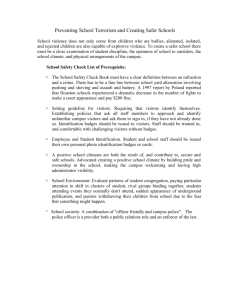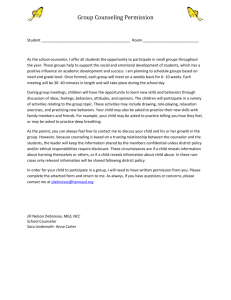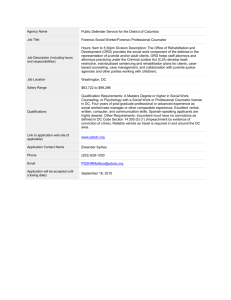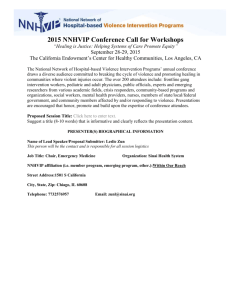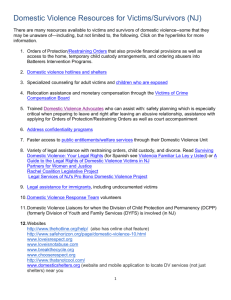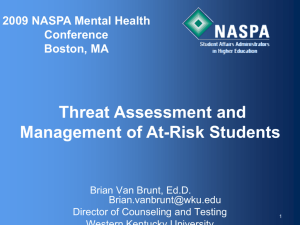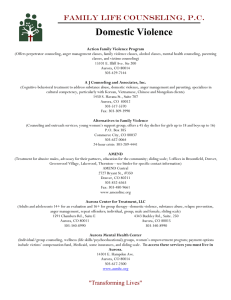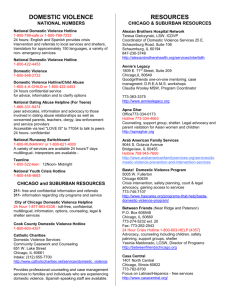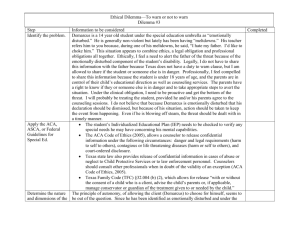Frequently Asked Questions Concerning Mental Health and
advertisement
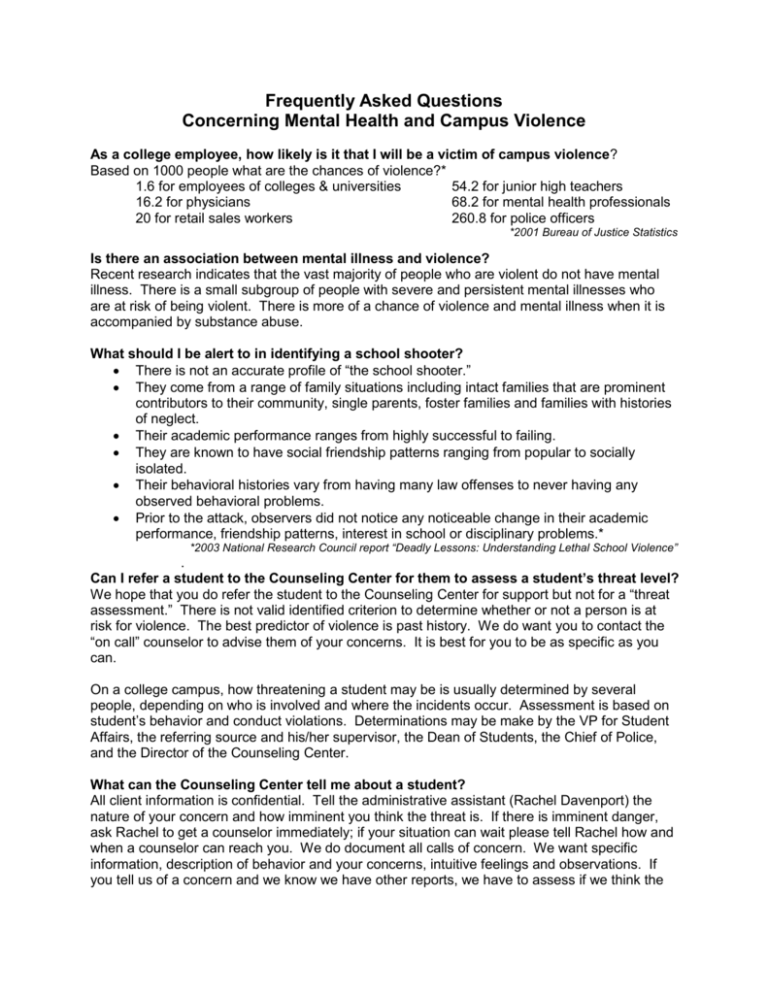
Frequently Asked Questions Concerning Mental Health and Campus Violence As a college employee, how likely is it that I will be a victim of campus violence? Based on 1000 people what are the chances of violence?* 1.6 for employees of colleges & universities 54.2 for junior high teachers 16.2 for physicians 68.2 for mental health professionals 20 for retail sales workers 260.8 for police officers *2001 Bureau of Justice Statistics Is there an association between mental illness and violence? Recent research indicates that the vast majority of people who are violent do not have mental illness. There is a small subgroup of people with severe and persistent mental illnesses who are at risk of being violent. There is more of a chance of violence and mental illness when it is accompanied by substance abuse. What should I be alert to in identifying a school shooter? There is not an accurate profile of “the school shooter.” They come from a range of family situations including intact families that are prominent contributors to their community, single parents, foster families and families with histories of neglect. Their academic performance ranges from highly successful to failing. They are known to have social friendship patterns ranging from popular to socially isolated. Their behavioral histories vary from having many law offenses to never having any observed behavioral problems. Prior to the attack, observers did not notice any noticeable change in their academic performance, friendship patterns, interest in school or disciplinary problems.* *2003 National Research Council report “Deadly Lessons: Understanding Lethal School Violence” . Can I refer a student to the Counseling Center for them to assess a student’s threat level? We hope that you do refer the student to the Counseling Center for support but not for a “threat assessment.” There is not valid identified criterion to determine whether or not a person is at risk for violence. The best predictor of violence is past history. We do want you to contact the “on call” counselor to advise them of your concerns. It is best for you to be as specific as you can. On a college campus, how threatening a student may be is usually determined by several people, depending on who is involved and where the incidents occur. Assessment is based on student’s behavior and conduct violations. Determinations may be make by the VP for Student Affairs, the referring source and his/her supervisor, the Dean of Students, the Chief of Police, and the Director of the Counseling Center. What can the Counseling Center tell me about a student? All client information is confidential. Tell the administrative assistant (Rachel Davenport) the nature of your concern and how imminent you think the threat is. If there is imminent danger, ask Rachel to get a counselor immediately; if your situation can wait please tell Rachel how and when a counselor can reach you. We do document all calls of concern. We want specific information, description of behavior and your concerns, intuitive feelings and observations. If you tell us of a concern and we know we have other reports, we have to assess if we think the student may be in a mental health crisis. If based on your information (and perhaps other information we have) we think the student may harm himself or others, we are required to either act or inform others. Don’t promise confidentiality when a student confides something that seems risky to you. When I think a student is weird or psycho what should I ask myself before I jump to conclusions? Examine what you know about the student and determine how unusual this behavior is compared to the student’s normal behavior. Could this behavior be caused by anything else such as developmental disorder (difficulty with social cues), substance abuse, brain injury, sleep deficit, disability, recent trauma or loss, cultural differences, or illness? Has this student matured beyond the adolescent “acting out” stage? Is it attention seeking behavior? Whom else can I consult with about this student’s behavior? Does the student’s weird behavior interfere with other’s ability to learn? Are more students coming to college with mental disorders? Probably yes. Counseling center directors report a significant increase in the number of students seeking counseling and the severity of the mental health concerns. The use of previous therapy and psychotropic medications may allow some students to concentrate enough in order to succeed in college that would not have previously attempted college. A 2004 study by the American College Health Association found that 45 percent of students surveyed felt so depressed that it was “difficult to function some of the time.” This same study reported that 11% of women and 9% of men had seriously considered suicide; 1.3% reported at least one attempt within the last school year. Can I (or somebody) require counseling? People in positions of authority (Dean of Students, VP for Student Affairs, Director of Housing) can mandate assessment and the student follow counselor’s treatment recommendations as a condition of their continued enrollment or ability to live in a residence hall. This must be consistent with Student Conduct Code; a student needs to violate rules for this to happen. Calling the police and getting their help often results in student being referred for assessment.




